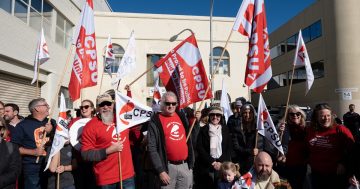
Australian Public Service Commission chief negotiator Peter Riordan hopes the union changes its mind. Photo: Supplied.
APS wage negotiations took a back seat while the nation voted over the Indigenous voice to parliament, but with the referendum now over, public servants are about to remind the government of another strong ‘no’.
With union bosses having already rejected the Australian Public Service Commission’s offer of an 11.2 per cent pay rise over three years across the service, industrial action is underway.
The offer, up from the 10.5 per cent offered in May, is nowhere near the 20 per cent hike over three years the Community and Public Sector Union is chasing.
But the Federal Government is not budging – yet.
A recent APSC update to staff highlights the benefits of the overall package on offer, including numerous employee wins on various conditions.
However, chief negotiator Peter Riordan has also signalled his willingness to keep talking.
“While the Commonwealth remains disappointed with employee representatives’ decision to reject the Commonwealth’s current offer, the chief negotiator remains available for negotiations with unions and employee bargaining representatives if they wish to reconsider the offer,” the missive states.
“In good faith, the Commonwealth will currently keep all aspects of the APS bargaining package on offer to APS employees.
“While we consider next steps in the process, we would like to ensure APS employees understand what they could get under the current package of pay and conditions.
“There are some significant enhancements employees will see under this package that we’ve built with employee representatives and remain optimistic we can come to a solution soon.”
The update points out that the 18-week paid parental leave changes in the package apply to “many APS parents”, and the paid leave entitlements are available to both primary and secondary caregivers up to 24 months after a baby is born.
“This opens up this leave entitlement to parents who have had a baby in the last two years,” it says.
“For secondary caregivers, more leave entitlements will be added each year as it increments to 18 weeks over the life of the agreement.”
Under the package on offer, secondary caregivers can expect to be entitled to 8 weeks from the start of the enterprise agreements, 11 weeks from March 2025, 14 weeks from the following March and 18 weeks from February 2027.
Selling the package further, the APSC is spits benefits for employees who are also personal carers.
“There are a range of expanded benefits for personal/carers leave to help APS employees manage their wellbeing and life outside of work,” it says.
“This is on top of 18 days personal/carers leave per year. If you have more, you’ll keep it.”
But while these benefits and other conditions, including flexible and work-from-home arrangements, have been welcomed by the union, the dispute all boils down to pay.
CPSU members voted 51.9 per cent in favour of accepting the government’s offer, but union bosses said that wasn’t a clear enough approval.
Industrial action is now underway across a number of agencies, with more to come.
Services Australia was the first target and industrial action is now commonplace there. But union members in the Fair Work Ombudsman, the Department of Agriculture, Fisheries and Forestry, and the Department of Employment and Workplace Relations have now all lined up to join in, although some are still awaiting the outcome of ballots lodged with the Fair Work Commission.
Work stoppages undertaken so far range from between an hour and 24 hours.
CPSU national secretary Melissa Donnelly said the government has a unique opportunity to negotiate a pay and conditions package that brings together a fragmented and disparate APS.
“The CPSU wants to see a package on the table that APS employees can proudly get behind, and we believe the government wants that too,” she said.
“There is a clear and simple fix here.
“The conditions package that has been negotiated contains industry-leading working from home rights, an increase to casual loading, significant improvements to paid parental leave and enhanced job security provisions, but APS employees have been clear in communicating that they want to see the government improve the pay offer.”
Original Article published by Chris Johnson on Riotact.











